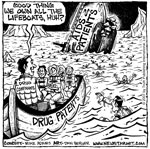Serotonin and Exercise - Regular, Vigorous Exercise Can Help You Overcome Depression
| Share on Facebook | Share on Twitter | Share on Google+ |
Depression is a world-wide phenomenon, but most people who become depressed don't seek medical attention. While nothing in this article is intended to discourage you from seeking a doctor's help, especially if you are contemplating suicide, the simple fact is that mild to moderate depression can be helped by a variety of natural therapies, including omega-3 fatty acids and exercise.
Dr. Nicholas Perricone reported a study in which half of a group of volunteers, all of whom had depression, was given a standard selective serotonin reuptake inhibitor, such as Prozac. Half of the volunteers were given fish oil. At the end of eight weeks, the volunteers who had been taking fish oil experienced greater relief from depression.
Andrea Dunn, Ph.D., of the Cooper Institute in Dallas, Texas, and psychiatrist Madhukar Trivedi of the University of Texas Southwestern Medical Center, also in Dallas, agree that exercise can elevate levels of serotonin in the brain. So a viable program for treating depression just might be a combination of omega-3 essential fatty acid supplementation, using products such as fish oil or microalgae oil, along with daily exercise.
But how much exercise is enough? And if your major symptom of depression is feeling tired all the time, how do you generate enough energy to do the exercise that is supposed to help you find more energy?
Most experts agree that you need at least two 45-minute exercise sessions every week to do any good. The reason a low-intensity, low-effort exercise program is not good for depression doesn't have anything to do with laziness or fear. The reason a low-intensity, low-effort exercise program, like walking around the block several days a week, is usually not a good plan is the risk of injury.If you are already physically weak from lack of exercise, then exercising for just a few minutes will only expose you to potential physical injury-which will make your depression worse! If you don't hae the time or can't muster the willpower to exercise 90 minutes a week, use other methods to control your depression. This is especially important for elderly persons who suffer depression.
Selective serotonin reuptake inhibitors are drugs in the same class as:
- Citalopram (Celexa, Cipramil, Cipram, Dalsan, Recital, Emocal, Sepram, Seropram, Citox, Cital)
- Dapoxetine(Priligy)
- Escitalopram(Lexapro, Cipralex, Seroplex, Esertia)
- Fluoxetine(Prozac, Fontex, Seromex, Seronil, Sarafem, Ladose, Motivest, Fluctin (EUR), Fluox (NZ), Depress (UZB), Lovan (AUS))
- Fluvoxamine(Luvox, Fevarin, Faverin, Dumyrox, Favoxil, Movox)
- Indalpine (Upstene) (discontinued)
- Paroxetine(Paxil, Seroxat, Sereupin, Aropax, Deroxat, Divarius, Rexetin, Xetanor, Paroxat, Loxamine, Deparoc)
- Sertraline(Zoloft, Lustral, Serlain, Asentra)
- Vilazodone(Viibyrd)
- Zimelidine(Zelmid, Normud) (discontinued)
These drugs reduce fear-based behaviors. They also reduce goal-based behaviors. If you are taking an SSRI, chances are you would find an exercise program very, very frustrating, and you probably should use other methods to augment your medication as long as you take these drugs.
What about weight loss? Once you succeed in increasing serotonin, weight loss will come a lot easier. The brain makes serotonin from the amino acid tryptophan, which enters the brain with help of insulin. Eating sugar increases insulin levels (in non-diabetics), so depressed people naturally crave sweets and high-carbohydrate foods.(Learn more about serotonin and weight loss).
Losing weight won't cure your depression. Because it will make absorption of tryptophan difficult, losing weight (in the unlikely event you were able to do it), would actually make depression worse. But treating depression will make losing weight easier as your brain replenishes its supply of serotonin.(See serotonin and depression).
The combination of exercise and fish oil is especially helpful for people who suffer bipolar disorder. The problem with antidepressants for people who have bipolar disorder is that treating the depressive "lows" can trigger the manic "highs." Exercise and omega-3 fatty acids, however, do not have that side effect.
-
Skin CareMen Skin Care
-
Free ResourcesFree eBooks
-
The way you think, the way you behave, the way you eat, can influence your life by 30 to 50 years.Deepak Chopra
-
Featured Health Supplement"...I also suffer from mild-to-moderate depression, so several months ago as an experiment I ordered a few bottles of the Neuro-Natural Serenity formula, but never took it consistently. However, I started taking it faithfully last week at full dose and already my spirits are lifting and I have a greater clarity of mind."
Cathi, USA -



















